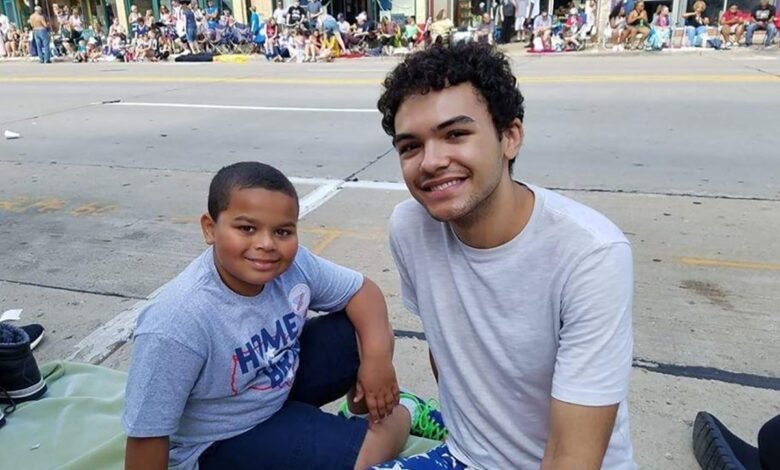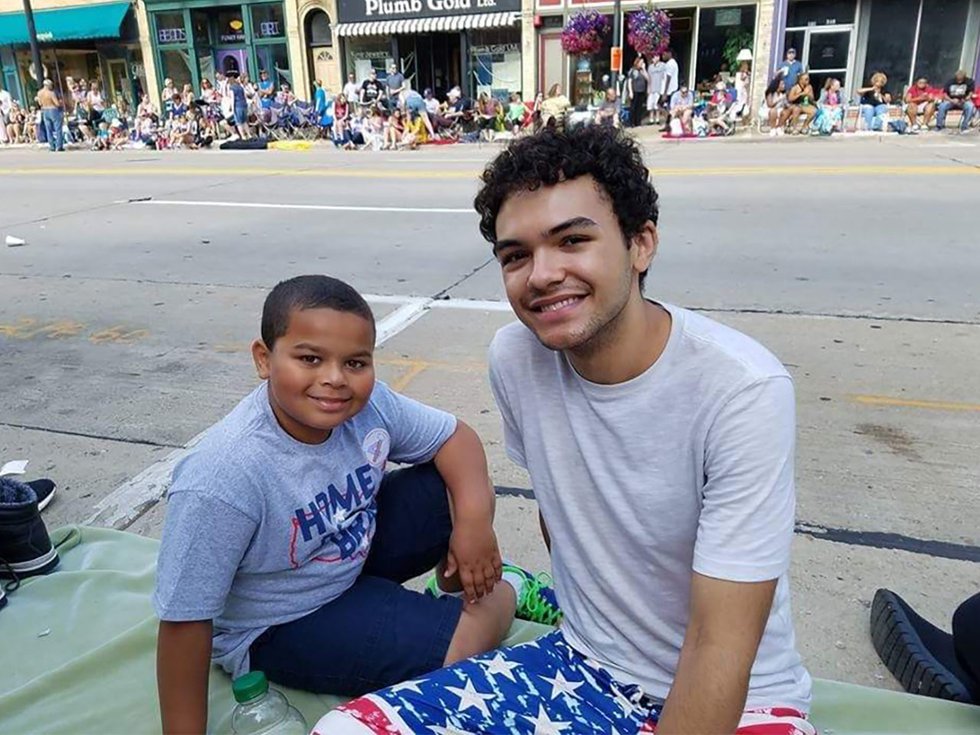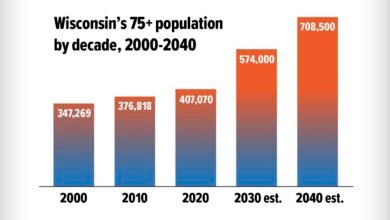Just before fatal police shooting, Kevin Price placed call to 911 – Isthmus


In reports related to the Aug. 12 police-involved killing of Kevin Price, a 28-year-old gay and biracial Fitchburg resident, the Wisconsin Department of Justice and Fitchburg Police Department did not specify who called 911 for a “disturbance” related to a violent domestic altercation. But according to a 911 dispatch recording, obtained through an open records request by Isthmus, Price himself called the emergency line to report an attack before police arrived.
PJ Chamberlain, a friend of Price, confirmed that it was Price’s voice in the recording. Price’s grandmother, who did not know Price had called 911 prior to Isthmus obtaining the recording, also confirmed it was Price’s voice on the recording.
Chamberlain sees Price as the victim in this incident: “He was the one that called for help, and then it got him killed.”
According to the 911 recording, Price called at 7:58 a.m., sounding out of breath. When asked for his address, Price said, “There’s an issue — we have no contact orders. And we saw each other. And he tried to break my neck.” The dispatcher then asked where this happened.
“Nevermind,” said Price, before hanging up. The dispatcher immediately called Price back but he didn’t pick up.
Reports at the time, both from the media and law enforcement, noted that a 911 call was placed early in the morning on Aug. 12 to report a “disturbance.” According to the Wisconsin Department of Justice report, when three officers arrived on the scene they encountered a witness who reported two people fighting. Upon encountering the individuals, police said they found Price with a knife. Fitchburg Police Sergeant Peter Johnston then shot Price three times in the chest at 9:07 a.m., according to a heavily-redacted Dane County Public Safety Communications incident detail report Isthmus received via an open records request. Price died at St. Mary’s Hospital three days later. The cause of death was a pulmonary embolism, according to an obituary.
The Wisconsin Department of Criminal Investigations was notified of the shooting at 9:49 a.m. on the day of the shooting, according to the incident report. The Wisconsin Department of Justice, which is investigating the case, declined to answer questions from Isthmus, including why Price’s call to 911 was not mentioned in public police statements. The DOJ also did not respond to a request to view body camera footage of Price’s death, which has still not been released.
“I am going to refer you to our most recent press release,” Gillian Drummond, DOJ director of communications, says in an Oct. 18 email. “We are not releasing any additional information prior to the DA issuing a decision.”
Under state law, investigators are required to release an incident report for officer-related deaths if a district attorney — in this case, Dane County District Attorney Ismael Ozanne — determines there is no basis to prosecute the responsible officer(s). Ozanne says in an Oct. 21 email to Isthmus that he has not yet made a decision whether to seek prosecution for any of the officers involved in the shooting.
Fitchburg Police Department policy says that when “circumstances reasonably permit,” officers should use nonviolent de-escalation strategies rather than deadly force, considered a last resort. Fitchburg does not have a specific mental health police unit, like Madison. The Fitchburg Police Department denied an open records request related to Price’s death, citing the case as an “ongoing investigation.”
Chamberlain, Price’s friend, operates an Instagram account dedicated to getting “justice” for Price and to share memories of him. Chamberlain has publicly questioned why Price’s family was not notified of Price’s being in the hospital until after Price passed away; officers shot Price on Aug. 12, but he died on Aug. 15 at St. Mary’s Hospital.
Police have not been forthcoming with information to Chamberlain or Price’s family, Chamberlain says. Finding out that audio exists of Price placing the 911 call was a surprise: “It’s really crazy to me that there’s audio, and not only is there audio, but it’s Kevin.” Chamberlain says that some news articles about the incident have implied that neighbors placed the call, not Price.
Chamberlain says that his perception of Price’s death “didn’t change” after hearing the phone call: “I’ve always felt like he was a victim in this situation, and it’s been tough because this vindication doesn’t bring him back.” Chamberlain says Price has been the victim of domestic violence in the past. Chamberlain doesn’t know why Price said “nevermind,” but wonders if Price was trying to hide the call from a partner or realized “every other time he’s been in that situation he’s ended up being the one that gets into trouble.”
Dane County court records indicate Price was charged with disorderly conduct in January 2024. He was found guilty of that charge in February 2024 after he failed to attend a status conference for the case. Price was also charged in January 2024 with breaking a no contact order “after domestic abuse arrest.” Shortly after Price’s death, the charge was dismissed — meaning that Price is presumed innocent of the charge — and Price’s $250 cash bond refunded.
“I also think when it comes to gay couples, police have a tendency to arrest both individuals instead of trying to figure out who was the victim and who was the perpetrator,” Chamberlain says. According to Price’s grandmother, Ruthann, a Dane County medical examiner found during an autopsy that Price’s body had multiple bruises, including on his spleen. The examiner, according to Ruthann, found that those bruises did not kill Price, but “clearly” indicated that “he had been beaten up.”
Police are more than 10 times more likely to use force against those experiencing a mental health crisis than those without mental illness, according to the National Alliance on Mental Illness. LGBTQ+ people disproportionately report discomfort interacting with police and are less likely to seek police assistance in the future after a negative experience, according to a 2024 report from the American Civil Liberties Union. The same report recommends establishing mental health service alternatives to police contact for those in crisis, adding that “people who are experiencing behavioral health crises should not have to communicate with law enforcement as first responders.”
Chamberlain became friends with Price, still a UW-Madison student at the time, around 2016; the two hung out frequently and bonded over shared interests in video games and movies. Chamberlain estimates he spoke last to Price around two weeks before his death — Chamberlain had texted Price a marketing image themed after Charli XCX’s brat album that Chamberlain made for the company where he works, Community Pharmacy.
“Oh, my God, that’s great,” Price had said in response. Chamberlain had reached out to Price again after that, but hadn’t heard back. Eventually, he found out about Price’s death through a friend’s Facebook message.
“It was almost immediately that I realized that something had to be really wrong, because stuff had happened before with him, and this friend had never reached out to me,” Chamberlain says.
He’s still looking for answers, particularly related to why Price’s family wasn’t notified of his death sooner. The DOJ did not respond to a question for comment from Isthmus about this.
“With Kevin, especially, I’m wondering where the ball was dropped, how often this happens? How soon do places follow up? It’s something I have tried to search for, but have not really found readily available.”



